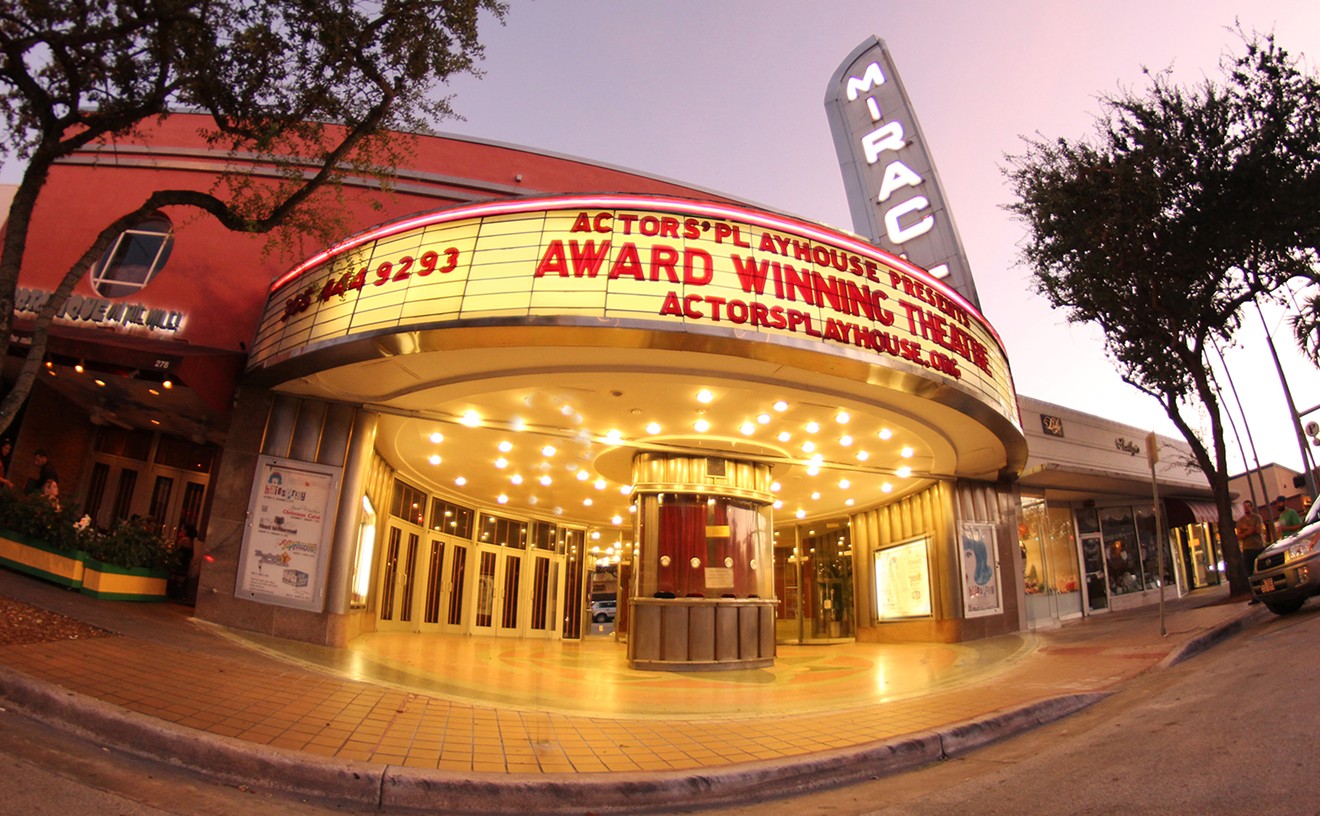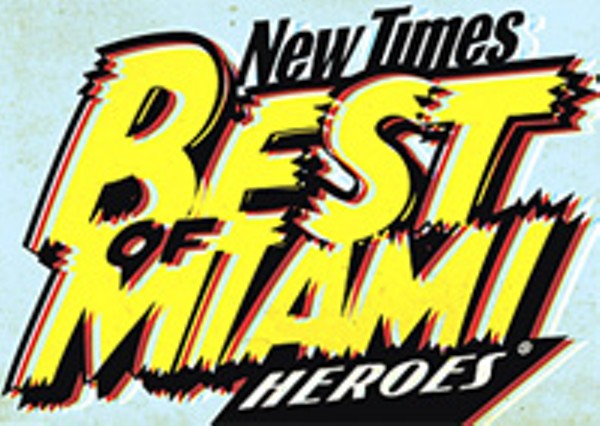In Three Angels Rivas's part consisted primarily of a monologue called "God's Greatest Invention," in which his character confessed to being madly in lust — not love, just lust — with a man. The whole performance was one long scream of trembling, jittering need, with lots of big, declamatory statements and huge, sloppy emotions. But out of that tempest came a handful of lines that possessed a weird grace and some kind of defeated composure, summoned from who knows where. One of those lines was this: "You said you don't mind doing it with boys. Well—what in God's name keeps you from doing it with the boy in meç" There are more than six billion people on this earth, and most of them have asked that question in some form: Why not meç When Rivas asked, the bottomless dignity in his face and in his voice told their stories as much as his own. This year no other actor even came close.
Best Charity
Inner City Outings
A branch of the Sierra Club, Inner City Outings is a unique little outfit that takes city kids to a world they rarely see: nature. Teenagers who associate wildlife with gang-bangers get the chance to cycle the Everglades, paddle the Little River, and camp overnight in a state park, among other adventures. Staffed by a small group of energetic outdoors enthusiasts, ICO runs 25 to 30 free trips a year, usually within a few hours' drive of Miami. The group works with local housing projects, social agencies, and neighborhood associations to find about 200 interested kids every year. And ICO is making its own future. Its Youth Leader Program mentors future trip leaders.
The third actor to accost the audience in Assurbanipal Babilla's Three Angels Dancing on a Needle, Miriam appeared as the wife of a man who'd killed himself by jumping off a bridge. She hated him a lot, and his death had done little to soften her rage. For an interminable time — truly interminable; she could have held the stage for instants or epochs — she stood there, body and voice trembling, all her communicative faculties short-circuiting at their inability to process the vastness of her anger, tracing the shape of her hatred with horrific blind references to episodes which are never quite illuminated, allowing the audience's imagination to extrapolate at will and guiding that imagination into very weird terrain. Walking fifty-seven blocks to the morgue to identify her husband's remains, she danced all the way — like a whore, she said, just like her husband's mother. When she did the dance onstage, her hips were like war machines, and her face was like nothing you've ever seen before — a writhing tableaux of electric evil so pure that, if you encountered it in life, it would almost certainly be the last thing you ever saw. Even within the relative safety of the theater, audiences felt an actual, physical revulsion. One spectator said, "If she came any closer to my seat, I was going to scream," and that's about right. It's worth mentioning: According to all reports, Miriam Kulick is a very sweet lady when she's not scaring the hell out of you.
Best Festival
Asian Culture Festival at the Fruit & Spice Park
Miami is a rich and meaty cultural stew, but a typical sampling of the sancocho is definitely heavy on mojo criollo and Jamaican jerk. We love it when the less-represented residents of the city come together and share their spice. For that reason we look forward to the Asian Culture Festival all year. The annual affair at the Fruit & Spice Park is the biggie of all the regional Chinese New Year and other Asian fests, and it's been going strong for eighteen years. Organized by the Thai American Association of South Florida, the event is usually held in early March (this year on March 3 and 4). More than 10,000 culture lovers ventured down to Homestead for the recent showcase of Asian flava. Even though the event celebrated the Chinese year of the pig, attendees were also able to enjoy a kaleidoscope of traditional folk dances from Bangladesh, India, Korea, Pakistan, the Philippines, Thailand, and Vietnam. This abundance is what makes this festival so dazzling. Athletic dudes get down with the Malaysian no-hands volleyball tournament known as sepet takraw, while all day long there are spectacular Chinese lion dances, a dragon boat display, acrobats, contortionists, and booming performances by Japanese taiko drummers. The highlight of most outdoor fests is the food, and there's a surfeit here. You can feast on bubble tea, sushi, stir-fried everything, spicy noodles, dim sum, satay, and curry. And don't forget the lychee ice cream. Because the event is at the Fruit and Spice Park, there's also plenty of exotic fruits, fruit and vegetable carving, and demonstrations of ikebana (Japanese flower arranging).
Best Promenade
Miami River Promenade at One Miami

Undiscovered territory while the city waits for the promenade to be connected to the one that runs along Bayfront Park, this is a sliver of unique urban beauty. It's right at the mouth of the Miami River, prime viewing spot for boats headed up and down river, the bay beyond, and the gleaming high-rises all around. The walk is a hundred or so yards long, and is lined with art (tile mosaics, funky steel sculptures, a huge psychedelic statue) and palm trees. And you'll likely have it to yourself.
- 325 S. Biscayne Blvd., Miami, 33131 Map
- www.onemiami.org
Best Supporting Actor
Matthew Glass in Romance
In a play full of plus-size performances, little Matt Glass dwarfed everybody. David Mamet's filthy courtroom farce was one of the year's funniest shows, and Matt was not only its funniest character but also the most sympathetic. The love-starved boyfriend of the prosecutor, he pranced into the courtroom leaving a trail of handcuffs and dildos in his wake, sat himself on the judge's knee, and proceeded to interrupt the workings of the American justice system with his tale of domestic woe. He was too ridiculous to take seriously — some terrible amalgam of everybody's most vicious stereotypes about vacuous drama-junkie queens —but he somehow made you feel for him anyway. Deeply. Those who saw him do it are still wondering how he pulled it off.
- 1200 Anastasia Ave., Coral Gables, 33134 Map
- 305-446-1116
- www.gablestage.org
Best Road to Avoid
Biscayne Boulevard between 70th and 79th Streets
There are few other roads in Miami-Dade County with the breadth and scope of the traffic nightmare that is Biscayne Boulevard. Construction has seemingly gone on for years, with no end in sight (one employee at a Dunkin' Donuts said it could last till May; we're not sure if he meant 2007 or 3007). Driving on the boulevard is a constantly changing and harrowing experience. Lanes come and go, orange cones disappear and reappear seemingly by the hour. In the past month, we've seen two accidents with our own eyes that were largely caused by inappropriate signage and general driver confusion. Walking along this stretch is impossible; anyone on foot has to climb over mountains of construction debris. Thinking about trying to patronize a business on the west side of the boulevardç Forget it. You will need a small tank to scale the debris/potholes/boulders. At night hookers, drug dealers, and folks waiting for the bus wander in the rubble. Certain parts (70th and Biscayne comes to mind) look like Baghdad: bombed out and depressing. Whoever planned this project at the FDOT should be fired. Or forced to commute on it every day, like we do. Oh, and don't even think about using NE Second Avenue as an alternate route. That, too, is regularly under construction.
Best Supporting Actress
Marcus Davis in La Cage aux Folles

Photo by Diego Pocovi
Marcus Davis is not, in fact, an "actress," nor is he even a woman. It doesn't matter. From the moment he stepped to the footlights at the Actor's Playhouse in its production of La Cage aux Folles as "Jacob," a maid/butler done up in lurid soubrette-cum-Mozart drag, he established himself as the most blazingly, supernaturally charismatic female force anybody had seen in a long while. In other productions of La Cage, there has been a tendency for actors playing Jacob to let the script do the work. The lines are so funny, and the character is such an incredible canvas, that you can easily win the hearts and minds of an audience by phoning it in, layering hambone gay stereotype atop hambone gay stereotype until you've got a creature so absurd that it's impossible not to laugh at him/her/it. Davis went a lot farther, making Jacob live and breathe in ways most folks never thought possible, digging not only humor, but affection, intelligence, and yes, even pathos out of a character designed for cheap, easy laughs. And he made it look so easy, so second-nature, that after leaving the show you'd be excused for wondering why no one ever thought to do it that way before.
- 280 Miracle Mile, Coral Gables, 33134 Map
- 305-444-9293
- actorsplayhouse.org
Best Acting Ensemble
Three Angels Dancing On a Needle, Square Peg Productions
Assurbinipal Babilla called his play Three Angels Dancing on a Needle, but Merri Jo Pitassi, Odell Rivas, and Miriam Kulick did a lot more than dance on that needle — they got skewered on it. If you were lucky enough to be hanging out in the Deluxe Arts complex this past January, you'd have seen one of the most jaw-dropping displays of dramaturgical virtuosity to hit Florida in ... well, who knowsç Three Angels was a play that brooked no real comparisons. Playing characters of pornographic ugliness, reeking of spiritual decay and utter moral desperation, the three actors urged each other on to operatic heights of shame and degradation before small audiences who, by play's end, didn't know whether to clap, puke, or kill themselves. Maybe Three Angels wasn't the most fun way to spend a Friday night, but these three actors didn't give a shit: They were playing for higher stakes than that. What those stakes might have been, the rest of us are still trying to figure out.
Best Mile of Miami
Flagler Street between the Miami River and NW 22nd Avenue
If Calle Ocho is the undisputed heart of Cuban America, then Flagler Street is the lesser-known capital of just about every other Spanish-speaking group in Miami, especially Central Americans. The mile-long length of Flagler west of the river is jam-packed with niche groceries, discount shoe stores, and food — ah, the food! In that short mile are dozens upon dozens of restaurants, cafeterias, bakeries, and truly awesome Nicaraguan fritanga. Flagler isn't a pretty street, but it's a busy one — the true center of Miami in more ways than one.





